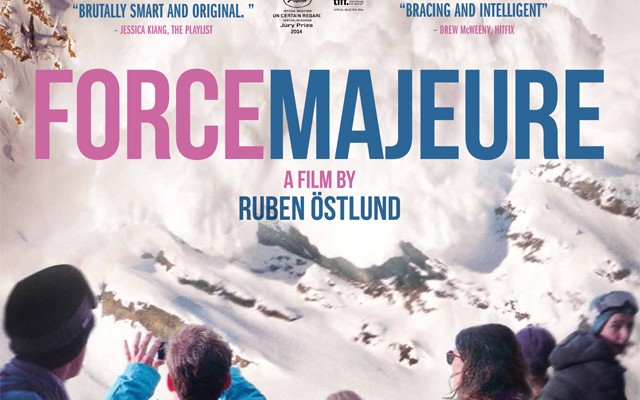Director: Ruben Östlund
Cast: Johannes Kuhnke, Lisa Loven Kongsli, Vincent Wettergren, Clara Wettergren, Kristofer Hivju, Fanni Metelius, Karin Myrenberg.
Rating: TBA
Running time: 118
DVD Release date: April 10th, 2015
The desire to negate nature, as man appropriates its bounty for himself. This is the thematic in mind during the pensive, opening shots of Force Majeure’s ski resort, as it fires up its ‘controlled’ avalanche technology. Nature, though, plays an indirect role in this arresting, expertly-acted family drama. It is the character’s psychological states that are prioritised here. Think the musings of Ingmar Bergman or Roman Polanski’s earlier work.
Shortly after establishing the locale, the audience is introduced to a wholesome looking family through a series of affable, family bonding scenes. One moment the four (Tomas, Ebba, Harry and Vera) are brushing their teeth in unison at the hotel apartment mirror, next, a series of heart-warming photos capture their jovial spirit – taken by the resident photographer. Like the photographer, director Ruben Östlund carefully arranges the family with aplomb. He sets up a comforting atmosphere, if only to lure the viewer into a false sense of security.
During lunch, the family experience an unsettling brush with a controlled yet wild avalanche. The event acts as a catalyst for the deep-seeded doubts the wife, Ebba, has regarding the integrity of Tomas as a father, husband, and most importantly, a man. Ebba reasons that if Tomas ran for cover during a close-run, controlled avalanche, to what degree is he committed to his family? What ensues is a harrowing decline of a thousand cuts. The deterioration of Ebba’s and Tomas’ relationship is quickly latched on to by their children, Vera and Harry. Both child actors shine, assisted by Östlund perfectly capturing their despair and sadness, framing them in theatrical positions under hard shadows. Unnervingly long takes eke out the tension between Tomas and Ebba, especially during the dinner scenes with Charlotte, her man for the day – and Mats and Fanny, respectively.
As Ebba begins to drift wayward, she encounters Charlotte in the foyer. In a brief debate, Ebba’s more traditional views on gender and relationships clash with Charlotte’s polyamorous philosophy. Charlotte’s views can be found at the radical end of Sweden’s gender equality culture. She’s a crude manifestation of egotistical hedonism, championing the ‘whatever doesn’t harm anyone else’ mantra to its destructive limits. How on earth, asks Charlotte, can Ebba’s self-esteem solely derive from being a mother and a one-man wife? Ebba’s despair comes not from this dubious conclusion, but from the emasculation of Tomas, his emotional constipation, and general apathy.
Tomas, maintaining denial over the avalanche, is eventually shown up by a drunken Ebba when video footage is unveiled during an awkward encounter with Mats and Fanny. Mats – who has the physiognomy of a Viking warrior – is anything but. Fanny confronts him after she feels the impact of Ebba’s dilemma. She argues that a 21 year old she knows is more emotionally rounded than Mats, turning his evening into one of self-doubt and insecurity. Force Majeure is not afraid to touch on the modern predicament of how, in demanding men to be emotionally in tune with women, while also expecting them to be ruggedly masculine, often results in neither. Tomas and Mats are cases in point, both are pathologically immature; they simply retreat to nostalgic desires when things get too much.
Östlund’s use of Vivaldi’s Four Seasons, especially in pivotal edit transitions adds to the film’s sense of theatricality and grandeur. Like Michael Haneke (or even Kubrick), these techniques evoke a brooding sense of some thing outside the film’s immediate world. During the final scenes, this transcendental feeling strangely takes on an earthly, conservative hue. After a terribly incompetent bus driver almost drives off the mountain, Ebba panics and decides she’s had enough. Everyone else agrees and gets off too. The scene connotes a communal solidarity between the travellers. All of a sudden it’s Tomas leading the stranded band, confidently smoking a cigarette, head held high. The radical feminist, Charlotte, is the only person who stuck with the reckless driver. She dismisses the shuffling band of stranded travellers, but at the risk of coming off the mountain.
Force Majeure maintains its depth to the very end: it asks questions, sometimes overtly, sometimes symbolically, and never fails to engage.
Verdict





























